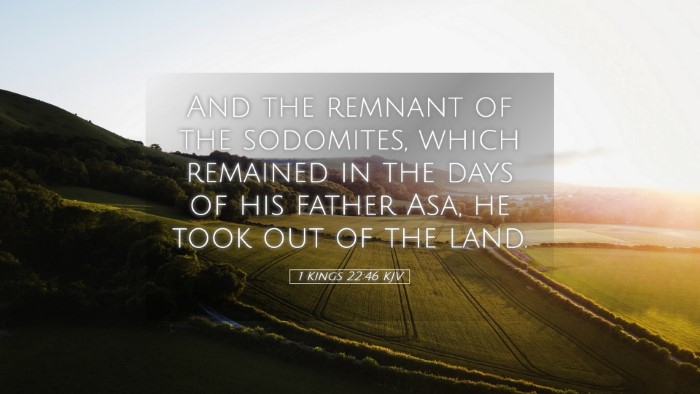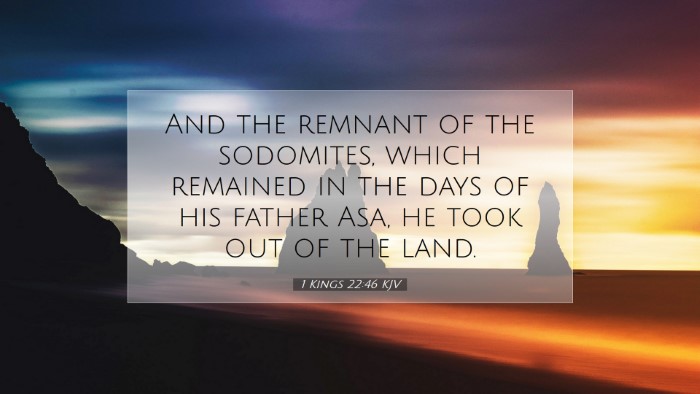Commentary on 1 Kings 22:46
Verse Context: 1 Kings 22:46 states: "And the remnant of the sodomites, which remained in the days of his father Asa, he took out of the land." This verse occurs within a broader discussion of the reign of Jehoshaphat and the spiritual state of Judah during this period.
Historical Context
The mention of sodomites refers to temple prostitutes that practiced cultic prostitution in the worship of false gods, particularly associated with the Canaanite practices. During King Asa's reign, significant reforms took place, and some remnants of these idolatrous practices remained, indicating an ongoing struggle against syncretism in Judah.
Commentary Insights by Matthew Henry
Matthew Henry emphasizes the moral degradation represented by the sodomites in the land. He notes that despite the righteous reforms initiated by Asa, there remained a residue of ungodliness that persisted. Henry points out that Jehoshaphat continued the reforms started by Asa, but the presence of these sodomites indicates that full repentance and purging of idolatry had not yet been achieved. The tolerance of such practices poses a question of spiritual integrity within the people of Judah.
Perspectives from Albert Barnes
Barnes contributes an insightful analysis of the significance of removing the sodomites from the land. He describes Jehoshaphat's actions as an attempt to restore the purity of worship in Judah and rid the nation of corrupt influences. Barnes encourages readers to view the removal of these idolatrous practices as not merely a political act but also a crucial step towards spiritual restoration. He asserts that the church today must remain vigilant against residual sin and idolatry within its midst.
Adam Clarke's Interpretation
Adam Clarke offers a detailed exposition of the cultural ramifications of idolatry and sexual immorality. He highlights that the presence of sodomites signified a departure from the covenantal obligations that Israel bore before God. Clarke draws parallels between the ancient practices and contemporary issues, urging the church to confront the societal norms that contradict biblical teachings. He underscores the need for leaders to actively engage in the removal of such moral decay from society to fulfill their divine responsibility.
Theological Implications
Judgment and Mercy: The text reflects God's judgments upon nations that turn away from His statutes. The existence of the sodomites in Judah represents a failure to fully surrender to God’s commandments. However, the active efforts by Jehoshaphat signify God's mercy allowing reform.
- Covenantal Relationship: The enduring presence of idolatrous practices highlights the challenge of maintaining fidelity in a covenantal relationship with God.
- Call to Sanctification: The purification process is an ongoing theme in Scripture, calling believers to daily sanctification and vigilance against sin.
Practical Applications for Today
For pastors and church leaders, this verse serves as a reminder of the importance of being vigilant against any form of idolatry or moral compromise within the congregation. The legacy of Asa and Jehoshaphat demonstrates the need for both prophetic courage and practical reform in church governance and community life.
- Holiness in Leadership: Church leaders must embody holiness, modeling a life that seeks to remove all traces of idolatry from their personal and communal worship.
- Educating on Biblical Values: There is a pressing need for educational initiatives within the church to equip believers with an understanding of biblical morality.
- Community Engagement: Churches should be engaged in their communities, advocating for values that align with Scripture and challenging the cultural norms that contradict it.
Conclusion
1 Kings 22:46 serves as a poignant reminder of the battle between good and evil, holiness and sin, within God’s people. As the leaders of Judah sought to purify the land and restore true worship, so must contemporary believers respond to the pervasive cultural influences attempting to distort biblical truth. Drawing from the insights of historical commentators, we are encouraged to pursue holiness and advocate for moral integrity, allowing God's transformative power to reshape our hearts and communities.


